UNION KNOWS!


UNION RULES
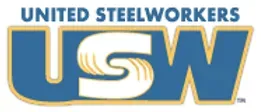
United Steelworkers Union
- Former President of United Steelworkers Local 4-318 (Edison, N.J.) guilty of embezzling $93,965.00.
- Former Financial Secretary of United Steelworkers Local 561 (Lancaster, Ohio) guilty of embezzling $24,833.00.
- Former Secretary-Treasurer of United Steelworkers Local 15485 (Springfield, Mo.) guilty of stealing $12,284.00 in union funds.
- Former President of United Steelworkers Local 2-47 (Green Bay, Wis.) guilty of theft of “an amount between $2,500 and $5,000.00.”
- Former Treasurer for United Steelworkers Local 12-1097 (Westport, Ore.) guilty of embezzling $19,911.00.
- Former President of United Steelworkers Local 378 (Aynor, S.C.) guilty of embezzling $9,345.00.
- Former Financial Secretary-Treasurer of United Steelworkers Local 208 (Irving, Tex.) guilty of embezzling $54,416.00 of union funds.
- Former Financial Secretary of United Steelworkers Local 458 (Plant City, Fla.) guilty of embezzling $43,941.00 in union funds.
- Former Treasurer of United Steelworkers Local 9-458 (Plant City, Fla.) guilty of embezzling $65,895.00.
- Former Financial-Secretary of United Steelworkers Local 480 (Pottsville, Pa.) guilty of embezzling $2,626.00.
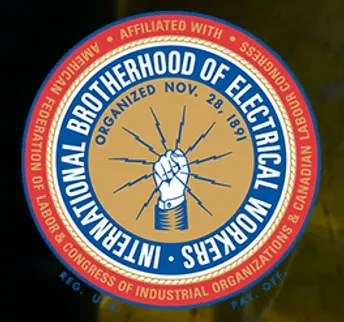
International Brotherhood of
Electrical Workers
- Former Secretary-Treasurer of IBEW Local 2359 (Sugar Grove, Ohio) guilty of embezzling $158,150.00.
- Former business manager for IBEW Local 898 (San Angelo, Tex.) guilty of embezzling $11,164.00.
- Former business manager for IBEW Local 545 (St. Joseph, Mo.) guilty of embezzling $23,768.00.
- Former dues clerk for IBEW Local 58 (Detroit, Mich.) guilty of embezzling $101,059.00.
- Former President of IBEW Local 249 (Geneva, N.Y.) guilty of embezzling $39,049.00.

International Association of Machinists
- Former Business Representative of International Association of Machinists District Lodge 65 (St. Cloud, Minn.) guilty of stealing $5,919.00.
- Former Secretary-Treasurer of International Association of Machinists Lodge 2458 (Minooka, Ill.) guilty of embezzling $62,263.00.
Every union's constitution says members must obey union rules.
If you break a union rule, you can be put on trial by the union and, if the union finds you guilty, you can be expelled from the union, suspended by the union, or forced to pay a fine.
Many unions prefer to fine their members because it increases the union's income.
See union constitutions for yourself -
The US Department of Labor requires union to file a copy of their current constitutions. Click here to go to the DOL web site.
Use the drop-down menu for the box labeled "Union name by abbreviation" to find the union you're interested in. Use the drop-down menu in the "union type" box to select "international." Then click the "submit" button at the bottom of the page.
When the union's page comes up, click on the name of the union (not the date of the "Fiscal Year" report). On the page listing the union's reports, scroll to the bottom to the union's Constitution.
How much are union fines? Here are some typical examples:
- Three United Steelworkers union members in Akron, Ohio were fined $625 each when they crossed a USW picket line to work during a strike. Another member was fined $2,500.00 when she refused to walk off her job during a strike. Still another crossed the union’s picket line and worked during a 50-week strike, and was fined $40,000.00.
- The International Association of Machinists union fined three workers at Caterpillar $15,564.00, $11,938.00 and $21,558.00 based on 60% of the wages they earned by crossing the picket line.
- The International Brotherhood of Electrical Workers union fined one member $275,000.00 for creating a web site criticizing the union. He fought the fine with help from the National Right to Work Foundation. To learn more, click here.
To see the member's web site about the IBEW, click here.
What can unions fine you for doing?
Union constitions list the things for which members can be punished. Here are a few examples:
International Association of Machinists constitution:
- Refusal or failure to perform any duty or obligation imposed by this Constitution; the established policies of the I.A.M.; the valid decisions and directives of any officer or officers thereof
- Accepting employment in any capacity in an establishment where a strike or lockout exists as recognized under this Constitution…
- Members shall discourage the working of overtime
- Members entering the Local Lodge room while under the influence of intoxicating drinks, or who are guilty of using indecent or profane language therein, shall be subject to penalty of reprimand, fine, suspension or expulsion...

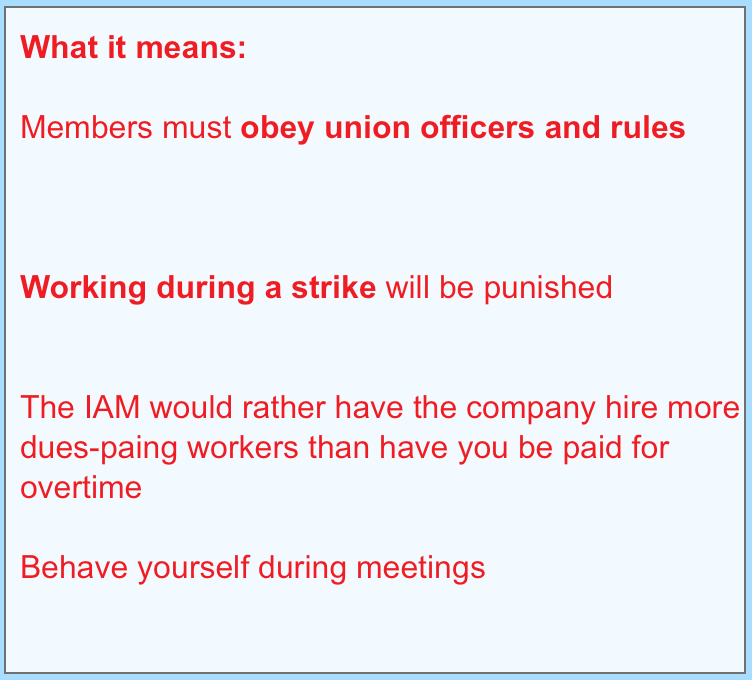
United Steelworkers constitution:
- Violation of any of the provisions of this Constitution, any collective bargaining agreement, or by-laws or rules of the Local Union
- Advocating or attempting to bring about the withdrawal of the International Union of any Local Union or any member or group of members
- Slandering or willfully wronging a member of the International Union
- Using abusive language or disturbing the peace or harmony of any meeting in or around any office or meeting place of the international union
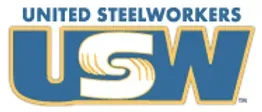
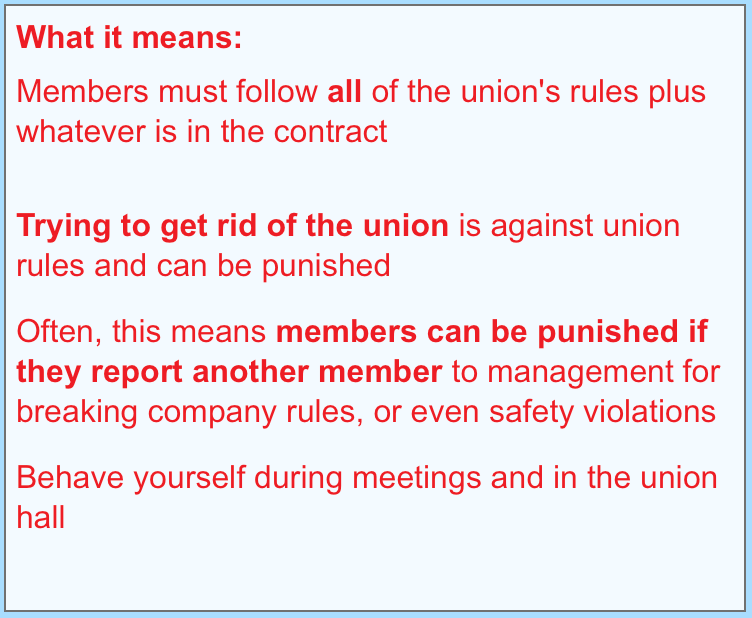
United Mine Workers constitution:
- Every member shall have the obligation to remain loyal to the International Union, the District, and the Local Union of which they are a member...
- Every member shall have the obligation to support all strikes authorized by the International Union, and to observe all picket lines endorsed by the International Union

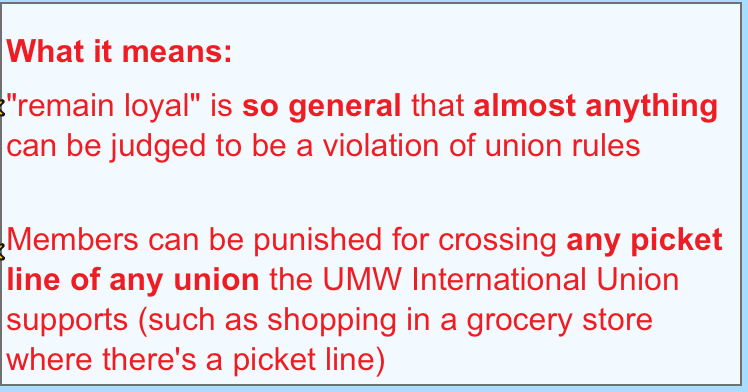
If the union puts you on trial for breaking a rule, you can't hire a lawyer?
Union constitutions say you can represent yourself and have another member help you, but you can't go outside the union to get help defending yourself.
If you don't pay a fine, the union can take you to court?
For example, the IAM Constitution says: “The cost of litigation arising from charges against a member by reason of such liabilities shall constitute a legal debt payable by such member.” (Article F, Sec. 1, p. 121).
In other words, you would have to pay both the fine and the court costs.

THE BOTTOM LINE:
No matter what anyone tells you, union constitutions say:
If you don't obey the union . . .
You'll have to pay the union



